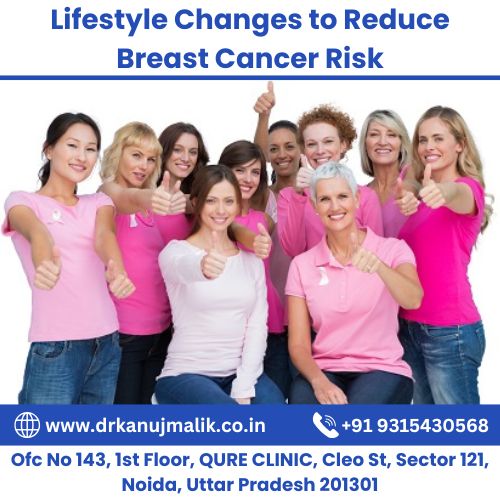Breast cancer is a major health concern for women worldwide. While family history and genetics play a significant role in the likelihood of developing breast cancer, lifestyle factors can have a profound impact on the risk. Through simple, everyday changes, you can significantly reduce your chances of developing breast cancer.
In this blog, we will discuss eight lifestyle changes that can help lower your risk, and introduce Dr. Kanuj Malik, a highly experienced surgical oncologist, who has been helping patients prevent and manage breast cancer for over 14 years.

1. Maintain a Healthy Weight
One of the most important steps in preventing breast cancer is maintaining a healthy weight. Being overweight, particularly after menopause, increases the production of estrogen, a hormone that can fuel the growth of certain types of breast cancer.
Maintaining a healthy weight through a balanced diet and regular physical activity is crucial. Keeping your body mass index (BMI) within a healthy range can significantly lower the risk of developing breast cancer.
2. Exercise Regularly
Physical activity is another powerful tool in the fight against breast cancer. Regular exercise helps regulate hormone levels, reduces inflammation, and improves immune function, all of which contribute to lowering breast cancer risk. Aim for at least 150 minutes of moderate aerobic activity or 75 minutes of vigorous activity each week.
Whether it’s walking, cycling, swimming, or strength training, regular physical activity can improve overall health and reduce the chances of developing breast cancer.
3. Eat a Balanced Diet
Your diet plays a critical role in cancer prevention. A diet rich in fruits, vegetables, whole grains, and lean proteins can help reduce breast cancer risk. Cruciferous vegetables, such as broccoli, cabbage, and cauliflower, contain compounds that may help block the effects of oestrogen, reducing the risk of breast cancer.
Additionally, fiber-rich foods and healthy fats can support overall well-being and help maintain a healthy weight. Avoiding processed foods, sugary snacks, and excessive red meat intake is also important in lowering your breast cancer risk.
4. Limit Alcohol Consumption
Alcohol consumption is linked to an increased risk of breast cancer. Even moderate drinking can raise the risk, particularly for women with a higher risk of the disease. Alcohol increases the level of estrogen in the body, which can fuel breast cancer growth.
Limiting alcohol consumption to no more than one drink per day, or ideally avoiding it altogether, can significantly reduce your risk of developing breast cancer.
5. Avoid Hormone Replacement Therapy (HRT)
Hormone replacement therapy (HRT) is often used to treat the symptoms of menopause, but studies have shown that long-term use of combined estrogen and progesterone therapy can increase the risk of breast cancer.
If you’re considering HRT, it’s essential to discuss the potential risks and alternatives with your doctor. Non-hormonal treatments for menopause symptoms may be a safer option, depending on your medical history and risk factors.
6. Breastfeed if Possible
Breastfeeding offers many benefits, both for the baby and the mother. Research has shown that breastfeeding can lower a woman’s risk of developing breast cancer, particularly if she breastfeeds for an extended period.
The hormonal changes that occur during breastfeeding, such as a delay in ovulation, may help reduce the exposure to oestrogen. Additionally, breastfeeding promotes early detection, as the increased sensitivity in the breasts can make it easier to spot any unusual lumps or changes.
7. Limit Exposure to Radiation and Environmental Pollutants
Excessive exposure to radiation, particularly during childhood, can increase the risk of breast cancer later in life. While it’s not always possible to avoid radiation completely, limiting unnecessary medical imaging, such as X-rays or CT scans, can help minimize your exposure.
Additionally, chemicals and pollutants in the environment, including pesticides, can contribute to cancer risk. Being mindful of the products you use and opting for natural alternatives can help reduce your exposure to harmful substances.
8. Regular Screenings and Self-Exams
Early detection is key to successfully treating breast cancer. Regular screenings, such as mammograms, are essential for identifying breast cancer at an early, more treatable stage. Women over 40 should schedule annual mammograms, and those with a higher risk may need to start screening earlier.
Additionally, self-breast exams are a simple yet effective way to become familiar with the normal appearance and feel of your breasts. If you notice any changes, such as lumps, pain, or skin changes, it’s important to seek medical advice as soon as possible.
About Dr. Kanuj Malik: A Leading Breast Cancer Specialist in Noida
Dr. Kanuj Malik is a highly experienced surgical oncologist with over 14 years of expertise in diagnosing and treating breast cancer. As a trusted breast cancer specialist in Noida, Dr. Malik is committed to providing personalized care, focusing on prevention, early detection, and the latest treatment options to help patients reduce their risk of breast cancer.
His compassionate approach and extensive knowledge make him a valuable resource for those seeking expert guidance in the fight against breast cancer.
Conclusion
Preventing breast cancer is not always within our control, but making proactive changes to our lifestyle can significantly reduce the risk.
Maintaining a healthy weight, exercising regularly, eating a balanced diet, limiting alcohol, and avoiding unnecessary hormone therapies are just a few of the ways to lower your chances of developing breast cancer. Early detection through screenings and self-exams is also crucial in the fight against breast cancer.
If you’re looking for expert guidance on preventing or managing breast cancer, Dr. Kanuj Malik, a leading breast cancer specialist in Noida, is here to support you.
With his extensive experience and dedication to patient care, He ensures that every patient receives the highest quality of care and the latest treatment options to reduce their breast cancer risk.
Qure Clinic
Address – Shop No 143 1st floor, Cleo Street, near CLEO COUNTY, Sector 121, Noida, Uttar Pradesh, 201301
Email –kanujmalik03@rediff.com
Phone – +91 9315430568
Monday To Saturday – 9:00AM–9:00PM
Sunday closed
Google Map Location Listing – https://g.co/kgs/BfrTkmW
